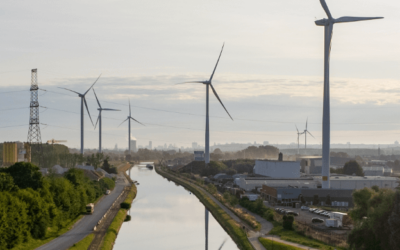The current climate transition has major implications for Europe’s regional economies. However, some regions will be hit much harder than others. Especially for the regions that will be hit hardest, the EU is setting up a new support mechanism of 55 billion euros. In this article we will focus on the first pillar, the Just Transition Fund (JTF). What can we expect?
The Just Transition Mechanism
The European Commission wants to ensure that all the inhabitants of the Member States are able to participate equally in the transition to a climate-neutral society. They have therefore created the Just Transition Mechanism (JTM), which aims to support the regions, sectors and workers most affected by the transition with 55 billion euros in the period from 2021 to 2027.
The Just Transition Mechanism consists of the following three pillars:
- the Just Transition Fund
- the Just Transition Scheme (InvestEU dedicated)
- the EIB Public Sector Loan Facility.
The Just Transition Fund
As the first pillar, the Just Transition Fund has funds worth around 19 billion euros, primarily in grants. The aim of this fund is to support the territories in the EU Member States that are most negatively affected by the transition. The JTF wants to accomplish this by alleviating the socio-economic costs triggered by the transition and supporting the economic diversification and reconversion of the territories most affected. The main objective is to help the people living in these territories to adapt in the jobs market.
Just Transition Plans
The most affected regions are called JTF regions and are chosen by the European Commission. Each region drafts their own Territorial Just Transition Plan (TJTP) in which the region explains how it wants to use the JTF funds to tackle the transition. These regional plans are then collected in a National Just Transition Plan (NJTP). The national plans fuse the TJTPs together to create a coherent mindset from each Member State.
This results in each region having their own goals for how the JTF will support their inhabitants. However, the general ways in which support can be provided include:
- productive investments in small and medium-sized enterprises
- the creation of new firms
- environmental rehabilitation
- investments in clean energy
- upskilling and reskilling of workers
- job-search assistance
- active inclusion of jobseekers programmes
- the transformation of existing carbon-intensive installations (if these investments lead to substantial emission cuts and job protection).
The application for the JTF is governed under shared management. The European Commission and each Member State have entered into partnership agreements with regional authorities or organisations. The regional authorities or organisations are chosen as the managing authority of the JTF funds and are responsible for selecting the projects to be funded.
What can we do for you?
EGEN’s experts are familiar with many major national, regional and European grant funds. The combined expertise of EGEN and PNO Group extends across all sectors, industries and areas of technology. We can assist interested parties in preparing for an JTF application process. For one, we can help you set up a strong consortium that is able to meet the criteria established. We may also help to translate the most promising plans into an official, winning grant application. Interested? Send us a brief description of your plans (and their regional scope) using the contact form below, and we will tell you more about the possibilities.


